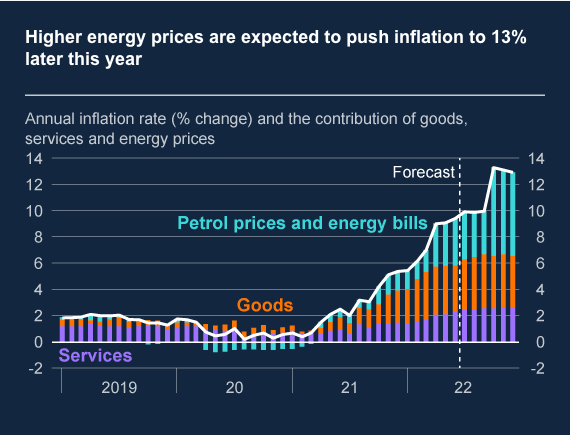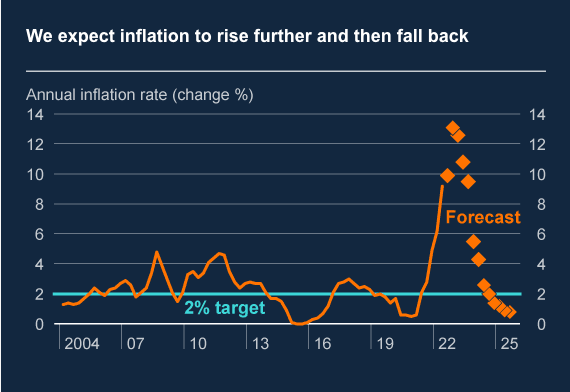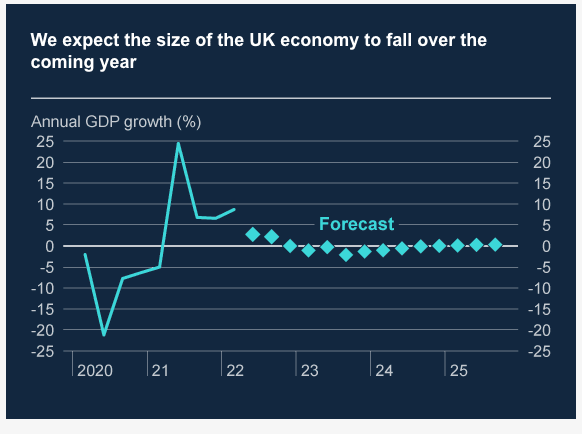Truss Energy Plans Could Slash Inflation's Peak
- Written by: Gary Howes

Image © Gov.uk. Picture by Simon Dawson / No 10 Downing Street.
A plan to cap UK energy bills could slash October's expected peak in UK inflation.
The UK's new Prime Minister is considering freezing energy bills for millions of households this winter according to reports, a decision that could slash the UK's inflation rates by as much as four percentage points as a result..
Liz Truss could announce an effective cap to energy bills as soon as this week.
Core inflation would nevertheless remain stubbornly high and invite further Bank of England interest rate hikes, according to independent research providers Capital Economics.
Ahead of confirmation Truss had won the contest for the next leader of the Conservative Party, the Telegraph reported a freeze of some form is now expected.
"The implications would depend on the detail, but it could mean that CPI inflation is something like 4 percentage points lower than otherwise," says Paul Dales, Chief UK Economist at Capital Economics, of an energy bill cap.
This means inflation might may rise from 10.1% in July to a peak of 10.5%, rather than 14.5% Capital Economics are currently forecasting.
It is estimated any plan to cap prices would cost £70-100bn, or 3-4% of GDP, which would be financed through borrowing.
In October the average annual energy bill will jump from £1,971 to £3,549 which would lead to a spike in inflation.
The Bank of England said in August it expects UK inflation would now peak "around 13%".
Above: The Bank of England's inflation forecast made in August. Image from the Bank of England.
It won't be a long wait for details as Truss said in a BBC interview on the weekend a support package would be announced within a week.
Should energy bills be capped, Capital Economics says real GDP wouldn't "fall as far".
"We doubt Truss will be able to prevent a recession. But her policies could limit its depth and length. Our current forecasts envisage real GDP fall by around 1% from its peak to its trough over a the course of a year," says Dales.
Although headline inflation will be protected from another energy-induced shock, underlying inflationary pressures in the economy might be boosted as a result of Truss' plans.
As households find their financial outlook as improved materially they might be inclined to spend more, particularly if a further £30BN worth of tax cuts are delivered, something Truss said she would introduce "from day one".
This boost to 'core inflation' would put further pressure on the Bank of England to raise interest rates.
Above: The Bank of England's inflation forecast made in August. Image from the Bank of England.
Capital Economics anticipates the Bank to hike to 3.0%, although the market is currently pricing in a terminal Bank Rate of 4.30%.
"Risks are that rates may have to rise further," says Dales.
Truss is meanwhile expected to guarantee ongoing Bank of England independence, easing fears held by economists and analysts Liz Truss might meddle with the central bank.
Writing in the FT, Kwasi Kwarteng, who is heavily favoured to be the country's next Chancellor, said "we also remain fully committed to the independence of the Bank of England".
Analysts have made much of Truss' commitment to look at the Bank of England's mandate, with some suggesting it's a sign the incoming Prime Minister wants to take a more direct approach to managing UK monetary policy and compromise Bank of England independence.
"For the first time since it was granted the freedom to set interest rates by Gordon Brown in 1997, the Bank’s independence looks to be under threat," said Larry Elliott, Economics editor at The Guardian in a recent op-ed.
It is implied that threats to the Bank's independence are to be seen as a risk to the UK economic outlook, and by extension, the Pound.
Above: Bank of England forecasts for UK economic growth. Image source: Bank of England.
"We expect a coming War of Independence over the Bank of England. This potential tussle and the politicisation of the UK's central bank is likely to create considerable uncertainty which will spook financial markets," says Nigel Green, chief executive and founder of deVere Group.
"We can expect the pound and the gilt market to react badly to any sense of growing political interference," he adds.
But Kwarteng's intervention on the day Truss is expected to be announced as the next leader of the Conservative Party confirms fears some have over indulged in speculation about what a Truss premiership means.
Kwarteng acknowledged "the important job" the Bank "have in the months ahead to bring down inflation. We believe co-ordination across monetary policy and fiscal policy is crucial."
What this coordination looks like, however, unclear.
"Forecasts are not destiny," adds Kwarteng. The Bank of England dominated newspaper front pages in August when it released forecasts showing inflation would rise to "around 13%" before the end of 2022.






